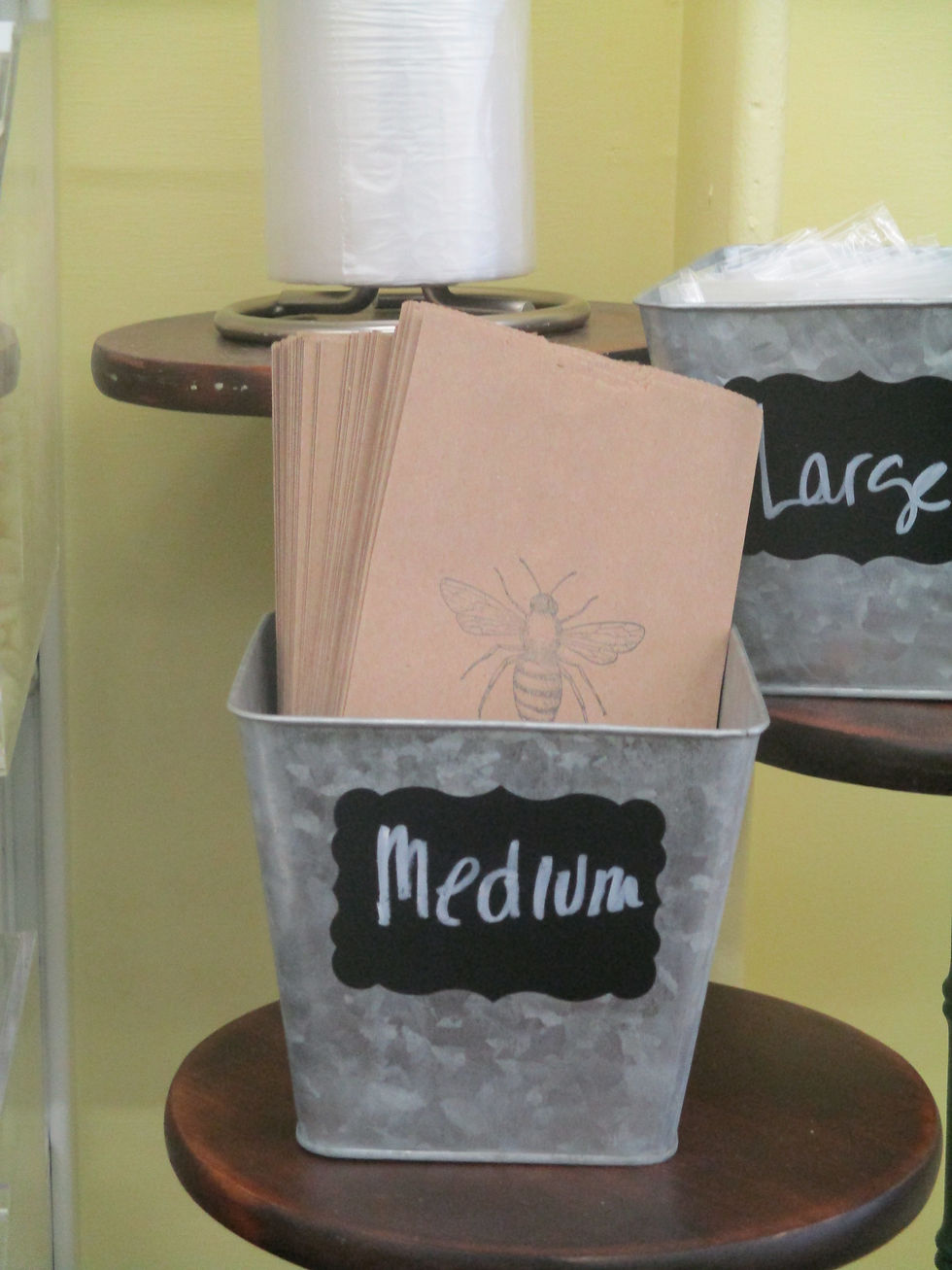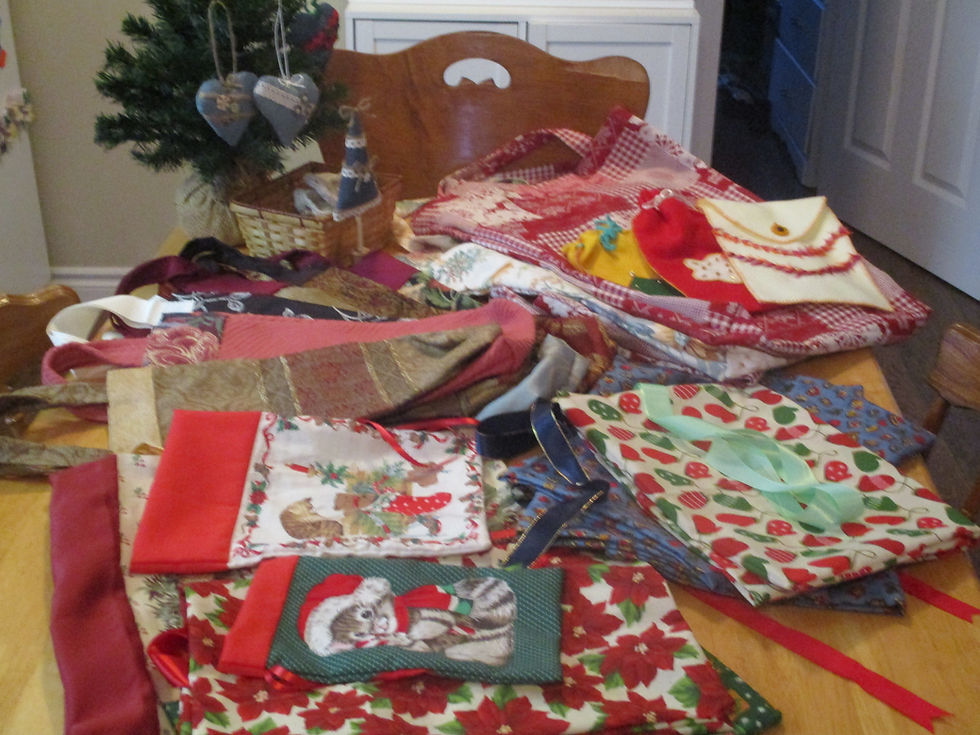Oats and Honey and Alternatives to Plastic
- Laura Crystal
- Oct 29, 2019
- 3 min read
One local business, Oats and Honey Bulk Foods, is taking a stance against plastic use by encouraging alternatives to plastic bags.

We used to live without plastic. It's true and it really wasn't so long ago. Plastic only began to be widely used in the 1920s, which, I guess, may seem like eons ago to anyone under 30. But in the context of human history, it was the blink of an eye. In the last 100 years, though, our society has become hopelessly addicted to using plastic. How can we break such a powerful habit? We certainly can't quit cold turkey. We must ween ourselves off of plastic and, luckily for us, there are many ways to do this that barely impact our lives.
Being the enviro geek that I am, I immediately noticed one of these simple solutions to plastic use in Oats and Honey, our local bulk food store. Inside the store, beside the neat rows of bins containing a scrumptious selection of bulk food, there are, of course, plastic bags and twist ties.
But, I was caught off guard, by the brown paper bags with a simple bee stamp on the side. I've always liked Angie, the owner of Oats and Honey (and kick-ass jewelry maker), but, in that moment, my respect for her went up a notch. This little thing she was doing was a big deal for me!
You see, I had just been researching the plastic garbage patches that are expanding quickly in our oceans (look up the Great Pacific Garbage Patch for more information) and so the enormity of our plastic problem was heavy on my mind. I knew I had to ask Angie about her choice.
I went back to Oats and Honey a few days ago and between helping customers, Angie helped me understand her paper bags. My first question was obviously why Angie chose to provide a paper choice. I thought I knew the answer but maybe she just liked the rustic, general store look of paper bags. She assured me that providing paper bags was, in fact, environmentally based.
After reading articles about the government's plan to ban single use plastics by 2021, Angie figured she should start getting her customers used to the alternatives. She not only has paper bags as an option but sells reusable cotton bags that are perfect for transporting bulk food.
While Angie and I were chatting, a customer came into the store and bought two things: one in a paper bag and one in a plastic bag. That made me wonder, the paper bags were cute and handy but how much were they actually being used? Angie told me that many customers did use the paper bags and the elementary school kids, who came in at lunch to buy candy (another addiction that I will not comment on), were especially fond of them. The only thing that people seemed reluctant to put in paper, she had added, were the spices. This was great news. But more inspiring information was yet to come.
Angie explained to me that quite a few of her customers already brought their own reusable containers from home.
Angie weighs the containers, marks their weight on the bottom with a sticker and then people fill them with whatever their heart's desire. Angie is happy to accept any type of container that fits on her scale: glass, plastic, metal or fabric. Her only requirement, is that the containers are clean (of course!).
As Angie helped another customer, I took a closer look around the store. I have to admit, that although I'd been in many times, I had never really browsed. Amidst the cheeky jewelry, quirky tea towels and other fun, unusual products, I discovered a locally made beeswax and fabric alternative to plastic wrap, reusable lunch bags and, much to my surprise and delight, soap nuts (if you haven't read my Eco Tips post, “Eco Nuts: The nutty laundry solution”, check it out for an explanation).
Before I left the store, I had one more question for Angie: are you doing anything else, through your business, to help the earth? She immediately answered, “I recycle. A lot!” Then after thinking a moment, she talked about some of the products she carried, donating food to the food bank when it was nearing its best before date and researching hemp-based biodegradable plastic bags as a future possibility.
When I finally said goodbye (and rushed out the door to pick up my kids from school), I felt optimistic about kicking our plastic addiction. Although, making the right environmental choices is often challenging for us, as consumers, Oats and Honey Bulk Foods makes avoiding plastic bags a breeze.
Thank you Angie for making a little change that matters a lot!
Oats and Honey Bulk Foods
47 Durham St S, Madoc

I love all of Angie's eco choices for the store and it feels good to find what we need locally. I hate having to add to our carbon footprint by driving to the city to find more eco friendly options. Thank you and keep it up.
this is a great positive news, a call for each one to do better, because it is possible...and, the best is, it's right there in Madoc, who will have known!!!thank you Laura for making the connection....Yes it is possible